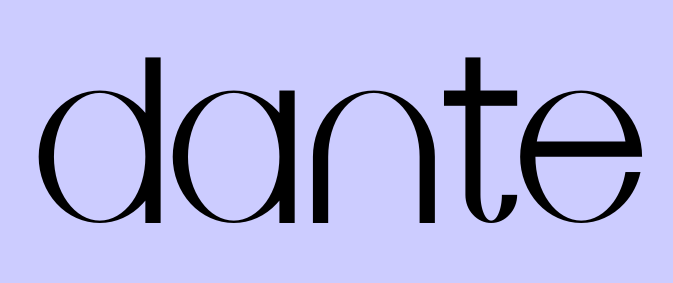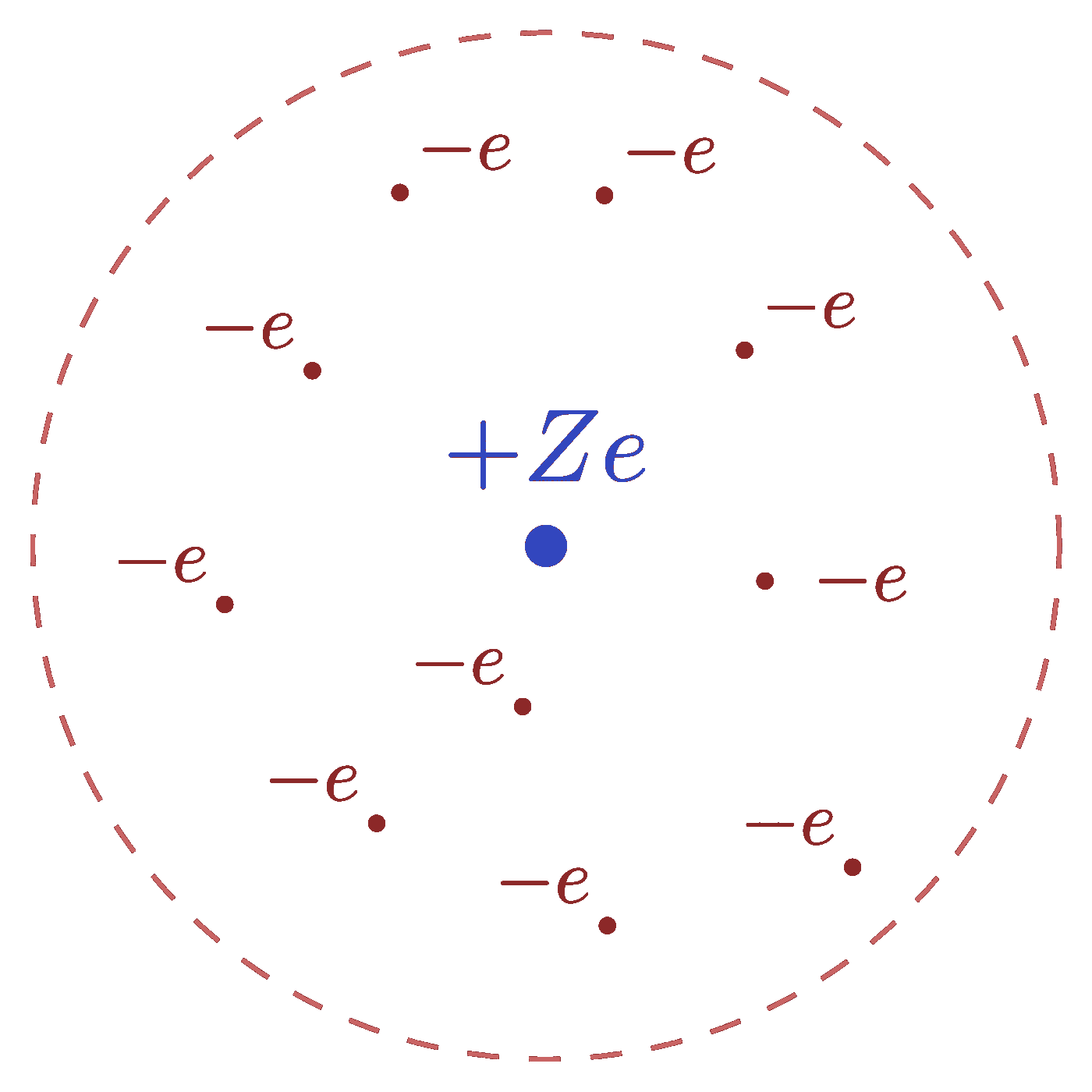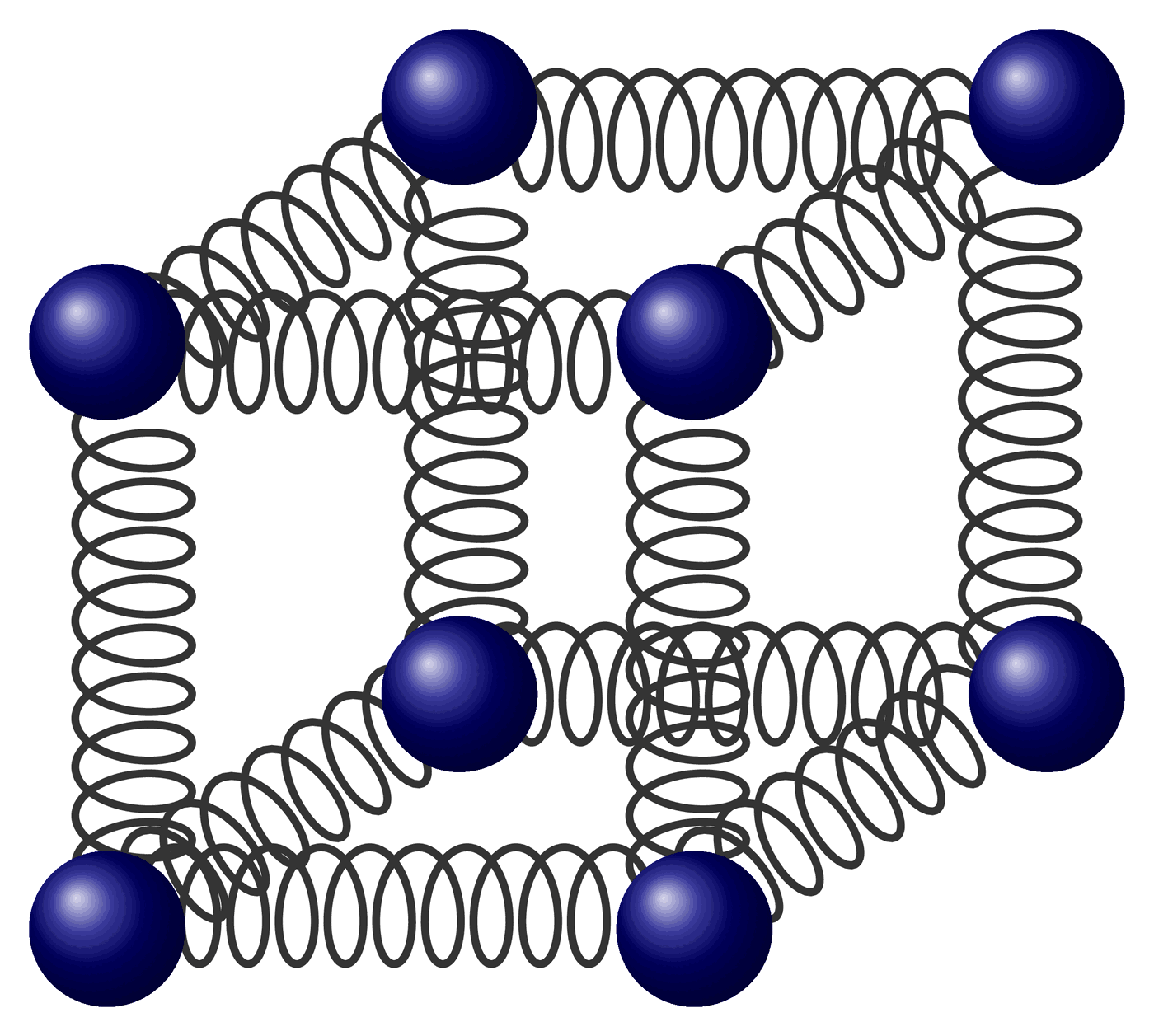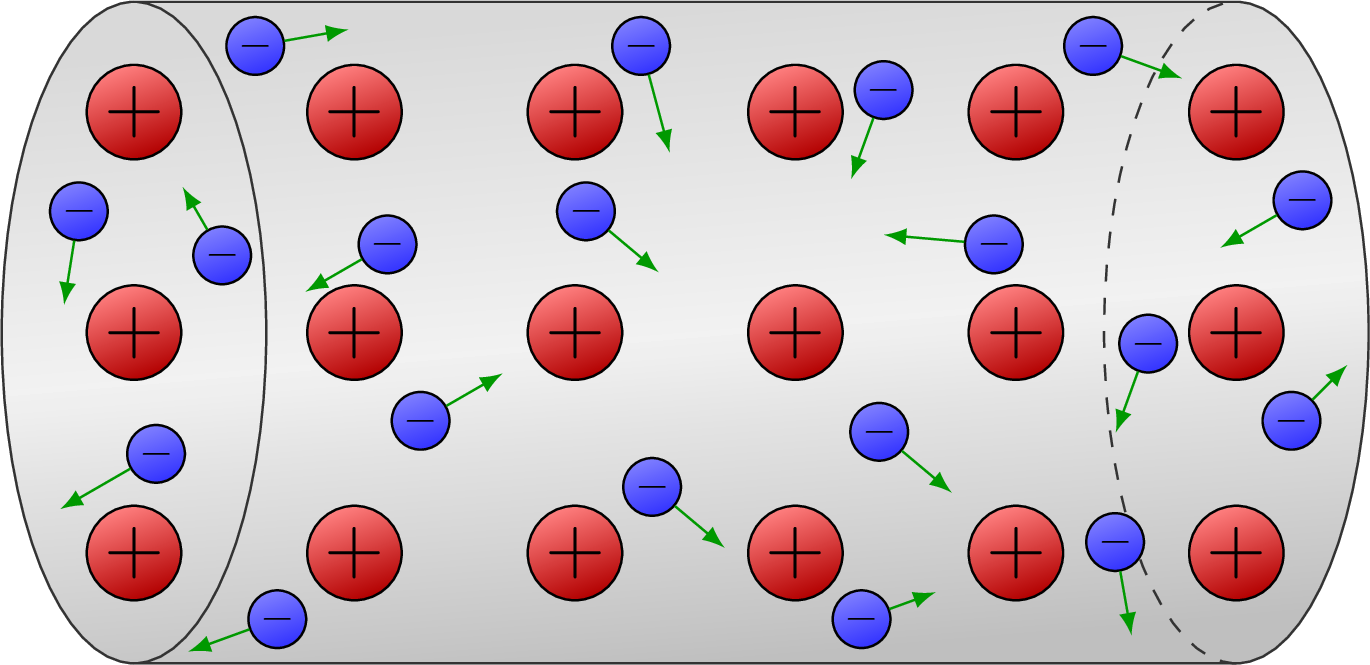The geometry of Rutherford scattering of α particles off gold nuclei is a hyperbolic trajectory as a function of the impact parameter. See Wikipedia or Hyperphysics. These figures were used in a presentation on Rutherford’s discovery of the nucleus.
Setup of the gold foil experiment:
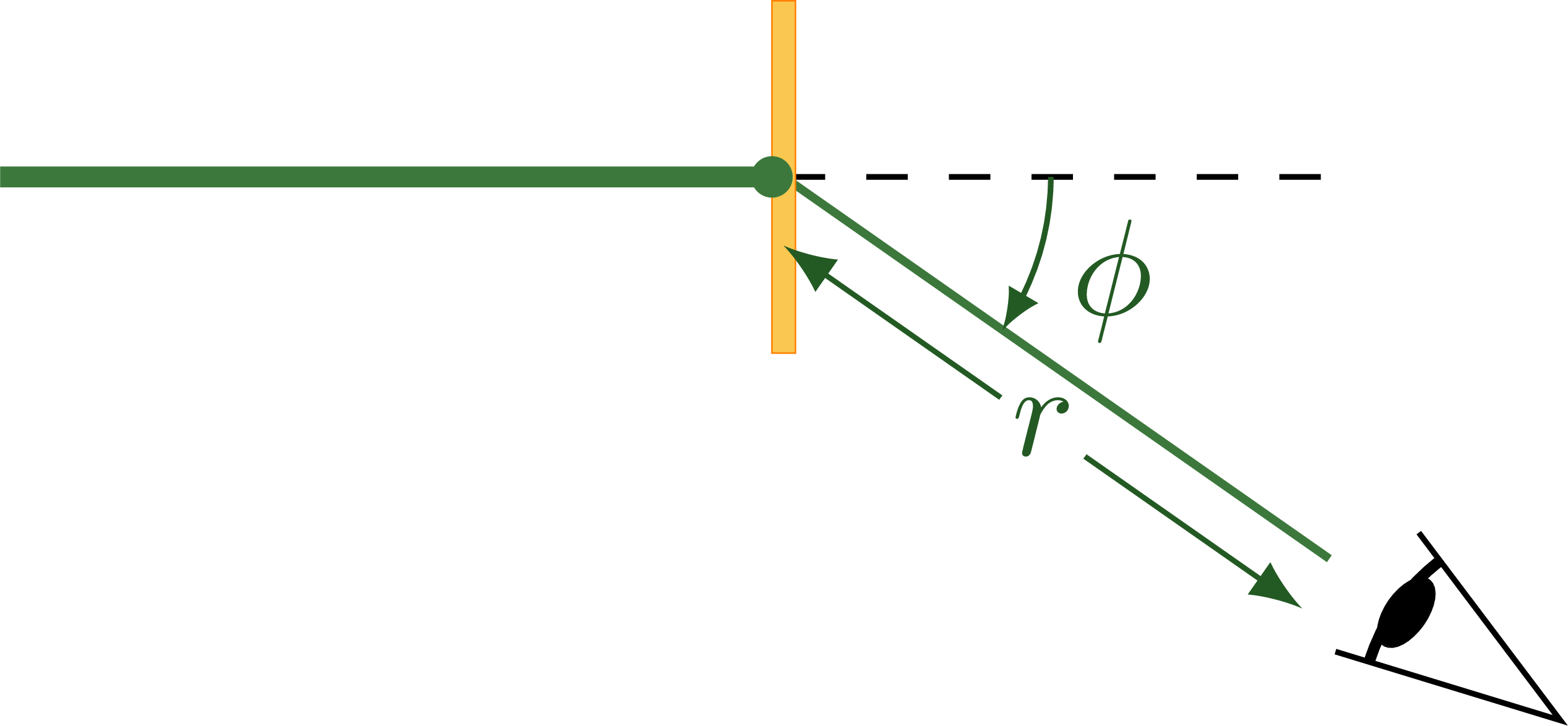
Hyperbolic trajectory of an α particle in Rutherford scattering, following Rutherford’s historic 1911 paper:

Triangle NOA to compute the angle of deviation φ = π – 2θ
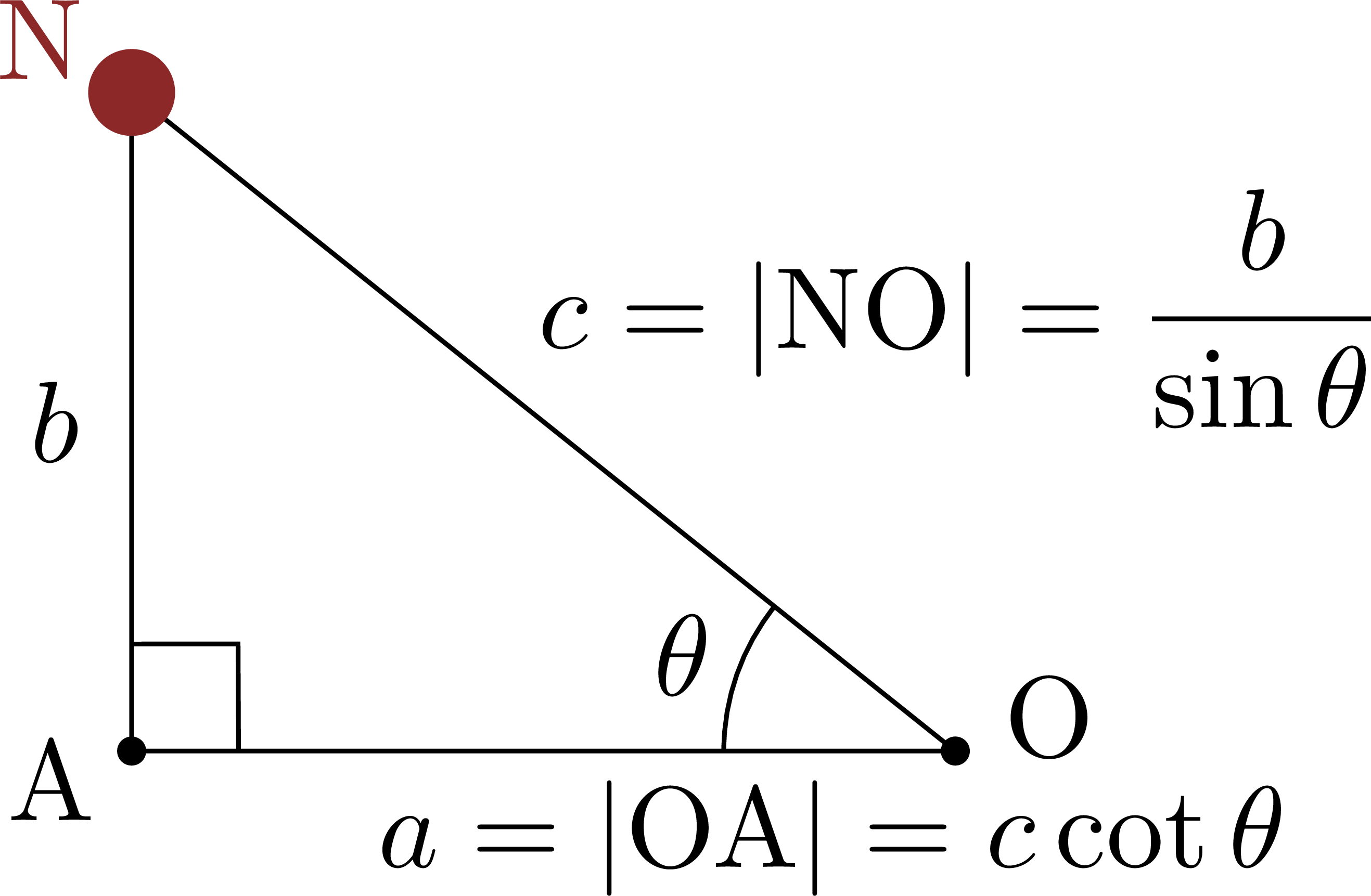
Several hyperbolic trajectories in Rutherford scattering:
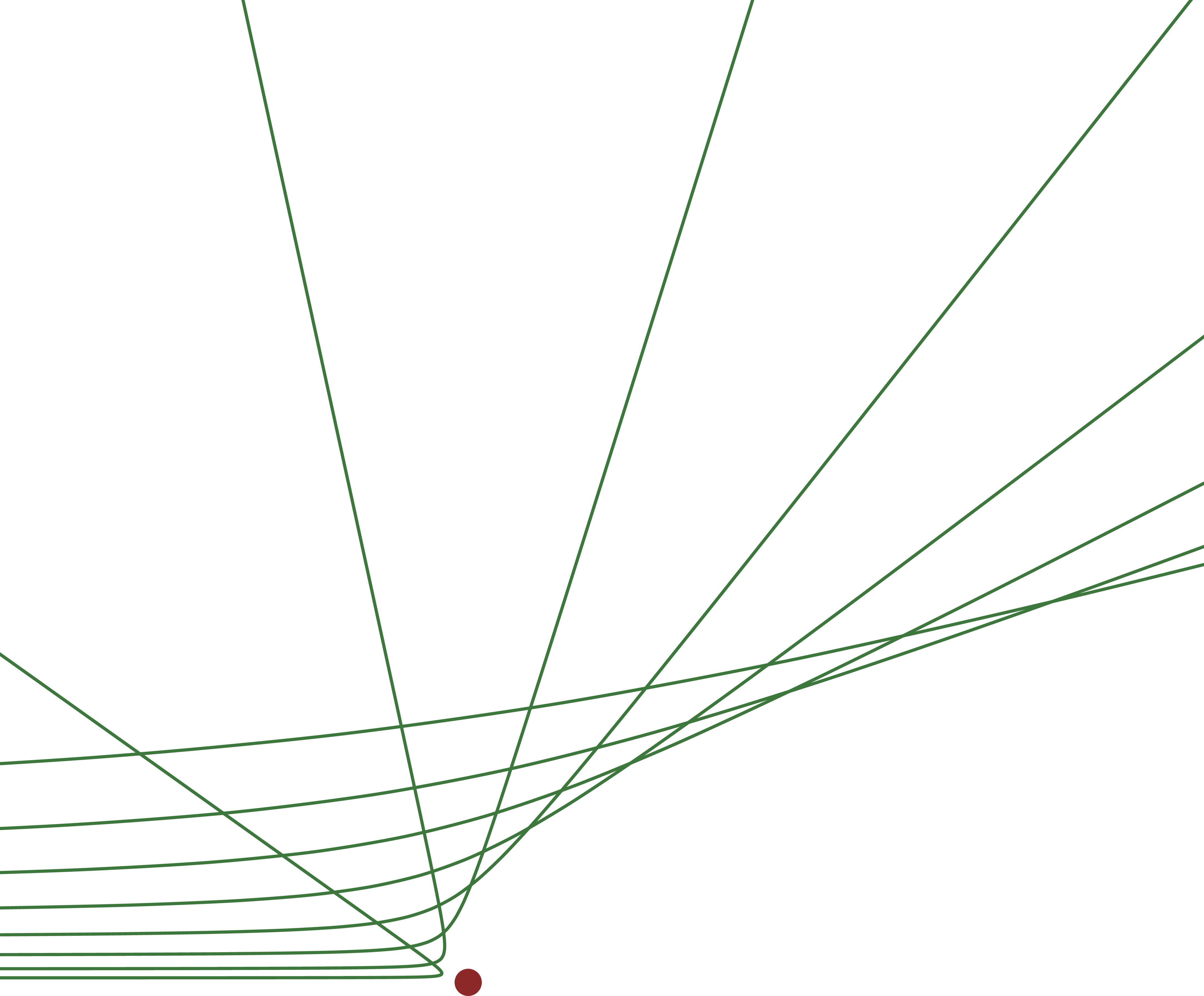
Compound vs. single scattering:
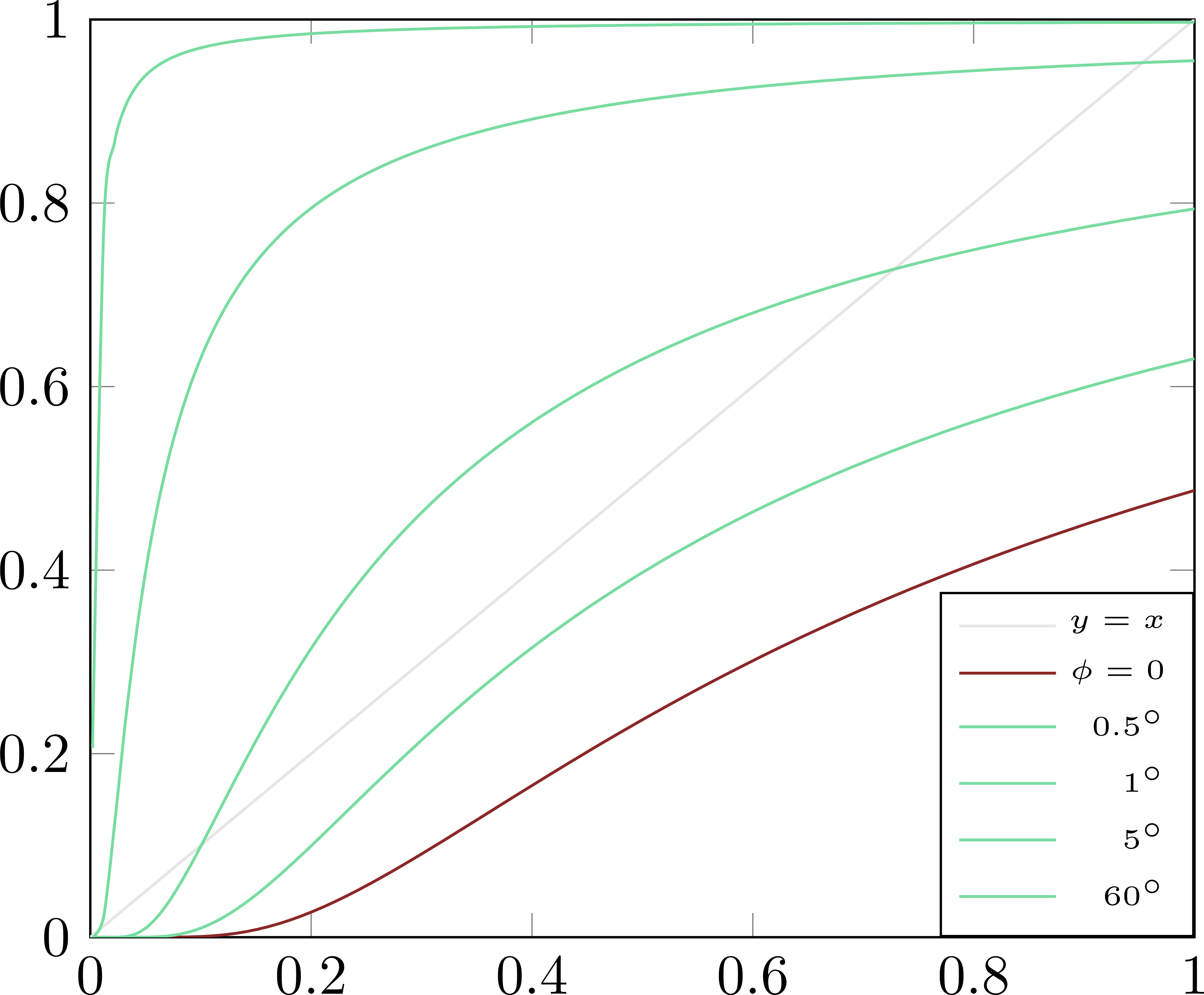
Edit and compile if you like:
% Author: Izaak Neutelings (July 2017)
% Sources:
% https://www.tandfonline.com/doi/abs/10.1080/14786440508637080
% https://indico.cern.ch/event/1126814/contributions/4729554/attachments/2386887/4079372/Izaak_paper_reading_Rutherford_nucleus_20170713_v5.pdf
\documentclass[border=3pt,tikz]{standalone}
\usepackage{amsmath} % for \dfrac
\usepackage{tikz}
\tikzset{>=latex} % for LaTeX arrow head
\usepackage{pgfplots} % for the axis environment
\usetikzlibrary{calc} % to do arithmetic with coordinates
\usetikzlibrary{angles,quotes} % for pic
\usetikzlibrary{arrows.meta} % for arrow size
\usetikzlibrary{bending} % for arrow head angle
\tikzstyle{bend>}=[-{Latex[flex'=1,length=3,width=2.5]}]
\tikzstyle{bend<}=[{Latex[flex'=1,length=3,width=2.5]}-]
% colors
%\definecolor{mylightblue}{RGB}{170,170,230}
\definecolor{mylightgrey}{RGB}{230,230,230}
\definecolor{mygrey}{RGB}{190,190,190}
\definecolor{mydarkgrey}{RGB}{110,110,110}
\definecolor{mygreen}{RGB}{120,220,160}
\definecolor{mydarkgreen}{RGB}{60,120,60}
\definecolor{myverydarkgreen}{RGB}{35,90,35}
\definecolor{mydarkred}{RGB}{140,40,40}
\definecolor{mylightblue}{RGB}{220,228,255}
\definecolor{myblue}{RGB}{183,191,229}
\definecolor{mydarkblue}{RGB}{50,70,190}
\definecolor{mygold}{RGB}{250,200,80}
% mark right angle
\newcommand{\MarkRightAngle}[4][1.3mm]{
\coordinate (tempa) at ($(#3)!#1!(#2)$);
\coordinate (tempb) at ($(#3)!#1!(#4)$);
\coordinate (tempc) at ($(tempa)!0.5!(tempb)$);%midpoint
\draw (tempa) -- ($(#3)!2!(tempc)$) -- (tempb);
}
\begin{document}
% RUTHERFORD SCATTERING
\begin{tikzpicture}[scale=1]
\message{^^JRutherford scattering}
% limits & parameters
\def\xa{-2.4}
\def\xb{ 4}
\def\ya{-4}
\def\yb{ 4}
\def\tmax{2.1}
\def\a{1.3}
\def\b{1}
\def\c{{sqrt(\a^2+\b^2)}}
\def\N{50} % number of points
% coordinates
\coordinate (O) at ( 0,0);
\coordinate (A) at (\a,0);
\coordinate (F1) at ( {sqrt(\a^2+\b^2)},0);
\coordinate (F2) at (-{sqrt(\a^2+\b^2)},0);
\coordinate (P) at (-{\a^2/sqrt(\a^2+\b^2)},-{\a*\b/sqrt(\a^2+\b^2)});
\coordinate (P1) at (\xb*\a, \yb*\b);
\coordinate (P2) at (\xb*\a,-\yb*\b);
\coordinate (yshift) at (0,0.4);
% axes & asymptotes
\draw[mygrey] % x axis
(\xa*\a,0) -- (\xb*\a,0);
%\draw[mylightgrey] % y axis
% (0,\ya*\b) -- (0,\yb*\b);
\draw[dashed,mydarkgrey]
(-\xb*\a*0.45, \ya*\b*0.45) -- (\xb*\a, \yb*\b)
(-\xb*\a*0.45,-\ya*\b*0.45) -- (\xb*\a,-\yb*\b);
% arrows
\def\vtheta{30}
\def\vradius{0.8}
\draw[->,myverydarkgreen,shift=($(P1)-(yshift)$),scale=0.6]
(0,0) -- (-\a,-\b) node[midway,below right=0pt] {${v}_i$};
\draw[->,myverydarkgreen,shift=($(P2)+(yshift)$),scale=0.6]
(-\a,\b) -- (0,0) node[midway,above right=-2pt] {${v}_f$};
\draw[->,myverydarkgreen]
(\a+0.35,{\vradius*sin(\vtheta)}) arc (180-\vtheta:180+\vtheta+10:\vradius)
node[above right=0pt] {$v^*$};
% angles
\MarkRightAngle[2.0mm]{F2}{P}{O}
\pic[draw,myverydarkgreen,"$\theta$",angle radius=13,angle eccentricity=1.35] {angle=F2--O--P};
\pic[draw,bend>,myverydarkgreen,"$\phi$"{scale=1,anchor=100,inner sep=4.5},angle radius=10] {angle=P--O--P2};
% hyperbola
\draw[color=mylightgrey,line width=0.5,samples=\N,smooth,variable=\t,domain=-\tmax*0.58:\tmax*0.58] % left
plot({-\a*cosh(\t)},{\b*sinh(\t)});
\draw[color=mydarkgreen,line width=1,samples=\N,smooth,variable=\t,domain=-\tmax:\tmax] % right
plot({ \a*cosh(\t)},{\b*sinh(\t)}); % {exp(\y)+exp(-\y)
% nodes
\draw[myverydarkgreen]
(F2) -- (P)
node[midway,below left=1,circle,fill=white,inner sep=-0.2] {$b$};
\fill
%(F1) circle node[above] {F}
(A) circle(1.5pt) node[above left=0] {A}
(O) circle(1.5pt) node[above=2pt] {O};
\fill[mydarkred]
(F2) circle(4.0pt) node[anchor=-60,inner sep=5] {N};
\node[left=1pt,above=-1] at ($(F2)!0.5!(O)$) {$c$};
\node[below right=-2] at ($(P)!0.4!(O)$) {$a$};
% alpha particle
\draw[mydarkgreen,fill]
({ \a*cosh(\tmax*1.02)},{\b*sinh(\tmax*1.02)}) circle(1pt)
node[above right=0pt] {$\alpha$};
\end{tikzpicture}
% RUTHERFORD SCATTERING - backscattering
\begin{tikzpicture}[scale=1]
\message{^^JBack scattering}
% limits & parameters
\def\xa{-1.8}
\def\xb{ 6}
\def\ya{-4}
\def\yb{ 4}
\def\a{0.8}
\def\b{0.02}
\def\tmax{2.5}
\def\c{{sqrt(\a^2+\b^2)}}
\def\N{100} % number of points
% coordinates
\coordinate (O) at ( 0, 0 );
\coordinate (A) at ( \a, 0 );
\coordinate (F2) at ( -{sqrt(\a^2+\b^2)}, 0 );
\coordinate (P1) at (\xb*\a, \yb*\b);
\coordinate (P2) at (\xb*\a,-\yb*\b);
\coordinate (yshift) at (0,0.2);
% axes & asymptotes
\draw[mygrey] % x
(\xa*\a,0) -- (\xb*\a,0);
% arrows
\def\vtheta{30}
\def\vradius{0.8}
\draw[->,myverydarkgreen,shift=($(P1)+(yshift)$),scale=0.6]
(0,0) -- (-\a,-\b) node[midway,above left=1pt] {$v$};
\draw[->,myverydarkgreen,shift=($(P2)-(yshift)$),scale=0.6]
(-\a,\b) -- (0,0); %node[midway,below right=0pt] {}; %${v}_f$
% hyperbola
\draw[color=mydarkgreen,line width=0.8,samples=\N,variable=\t,domain=-\tmax:\tmax]
plot({ \a*cosh(\t)},{\b*sinh(\t)});
% nodes
\fill
(A) circle(1.5pt) node[above=2pt,scale=0.9] {$v^*=0$};
\fill[mydarkred]
(F2) circle(4.0pt) node[above=4pt] {N};
\draw[<->,myverydarkgreen,transform canvas={yshift=-6pt,scale=0.95}]
(F2) -- (A)
node[midway,fill=white,inner sep=1] {$d^*$};
% alpha particle
\draw[mydarkgreen,fill]
({ \a*cosh(\tmax*1.02)},{\b*sinh(\tmax*1.02)}) circle(1pt)
node[above right=0pt] {$\alpha$};
\end{tikzpicture}
% RUTHERFORD GOLD FOIL EXPERIMENT - setup
\begin{tikzpicture}[scale=1]
\message{^^JGold foil experiment}
% limits & parameters
\def\xa{-2.0} % incoming beam length
\def\xb{ 1.4} % horizontal line right
\def\le{0.6} % eye size eye
\def\ange{18} % eye opening angle
\def\lb{1.7} % outgoing beam length
\def\ang{-35} % outgoing beam scattering
\def\h{0.45} % gold foil height
\def\w{0.03} % gold foil width
% coordinates
\coordinate (A) at (\xa,0); % incoming beam
\coordinate (R) at (\xb,0); % right line
\coordinate (O) at ( 0,0); % beam hitting foil
\coordinate (B) at (\ang:\lb); % outgoing beam
% beams
\draw[dashed] (O) -- (R);
\draw[mydarkgreen,line width=1.5]
(A) -- (O);
\draw[mydarkgreen,line width=0.6]
(O) -- (B);
\fill[mygold,draw=orange,line width=0.1] (-\w,-\h) rectangle (\w,\h); % gold foil
\fill[mydarkgreen]
(-\w,0) circle(1.5pt);
% angles & distance
\draw[<->,myverydarkgreen,transform canvas={yshift=-5pt,scale=0.95}]
(O) -- (B) node[midway,circle,inner sep=0.5,fill=white] {$r$};
\pic[draw,bend<,myverydarkgreen,"$\phi$",angle radius=19.4,angle eccentricity=1.29] {angle=B--O--R};
% eye
\begin{scope}[shift={(\ang:\lb+1.2*\le)},rotate=\ang+180]
\draw[] (\ange:\le) -- (0,0) -- (-\ange:\le);
\draw[thick] (\ange:0.85*\le) arc(\ange:-\ange:0.85*\le);
%\draw[fill,brown] (0.75*\le,0) ellipse ({0.10*\le} and {0.21*\le});
\draw[fill] (0.8*\le,0) ellipse ({0.08*\le} and {0.16*\le});
\end{scope}
\end{tikzpicture}
% RUTHERFORD SCATTERING - hyperbola triangle
\begin{tikzpicture}[scale=2.5]
\message{^^JHyperbolic triangle}
% coordinates
\coordinate (O) at ( 0,0);
\coordinate (A) at (-1,0);
\coordinate (B) at (-1,0.8);
% lines
\draw[]
(O) -- (A) node[pos=0.15,below=-1] {$a=|\text{OA}|=c\cot\theta$} %\dfrac{c}{\tan(\theta)}
-- (B) node[pos=0.5,left=1] {$b$}
-- (O) node[pos=0.5,above right=-4] {$c=|\text{NO}|=\dfrac{b}{\sin\theta}$};
% points
\fill
(A) circle(0.5pt) node[anchor= 20,inner sep=3pt] {A}
(O) circle(0.5pt) node[anchor=200,inner sep=4pt] {O};
\fill[mydarkred]
(B) circle(1.5pt) node[anchor=-30,inner sep=4pt] {N};
% angles
\MarkRightAngle{B}{A}{O}
\pic[draw,"$\theta$",angle radius=20,angle eccentricity=1.25] {angle=B--O--A};
\end{tikzpicture}
% RUTHERFORD SCATTERING - hyperbolic orbits with different impact parameters
\begin{tikzpicture}[scale=1]
\message{^^JHyperbolic trajectories}
% limits & parameters
\def\xa{-35}
\def\xb{ 55}
\def\ya{ -1}
\def\yb{ 55}
\def\tmax{5}
\def\N{30} % number of points
\begin{axis}[ xmin=\xa,xmax=\xb,
ymin=\ya,ymax=\yb,
hide x axis, hide y axis,
]
\def\a{1}
\foreach \u in {1,3,6,10,15,21,28,38}{
\message{^^J u=\u}
\def\b{\u*0.25}
\def\c{sqrt(\a^2+\b^2)}
\addplot[color=mydarkgreen,line width=0.5,samples=\N,smooth,variable=\t,domain=-\tmax:\tmax]
({ \a/\c*(-\a*cosh(\t)-\c) + \b/\c*\b*sinh(\t) },
{ -\b/\c*(-\a*cosh(\t)-\c) + \a/\c*\b*sinh(\t) });
}
\addplot[mydarkred,mark=*,mark size=2pt,mark options=solid] coordinates {(0,0)};
\end{axis}
\end{tikzpicture}
% RUTHERFORD SCATTERING - single vs. compound scattering
% http://www.ffn.ub.es/luisnavarro/nuevo_maletin/Rutherford%20(1911),%20Structure%20atom%20.pdf
% https://tex.stackexchange.com/questions/45151/format-numbers-as-a-fraction-of-pi-with-tikz-pgfmathprintnumber
\begin{tikzpicture}[scale=1]
\message{^^JSingle vs. compound scattering}
% limits & parameters
\def\xa{0.0}
\def\xb{1.0}
\def\ya{0.0}
\def\yb{1.0}
\def\A{ 1.0}
\def\B{ 1.0}
\def\N{100} % number of points
\begin{axis}[ xmin=\xa,xmax=\xb,
ymin=\ya,ymax=\yb,
legend cell align=right,
legend style={
at={(1.0,0.0)},
anchor=south east,
font=\fontsize{5}{6}\selectfont
}
]
\addplot[color=mylightgrey,line width=0.5,samples=2,variable=\x,domain=0:1]
(\x,\x);
\addlegendentryexpanded{$y=x$}
\addplot[color=mydarkred,line width=0.5,samples=\N,variable=\px,domain=0:1]
({ \px },{ \A*exp(-0.72/(\B*\px)) });
\addlegendentryexpanded{$\phi=0$}
\foreach \ang in {0.5,1,5,60}{
\message{^^J ang=\ang}
\def\myphi{pi*\ang/180}
\addplot[color=mygreen,line width=0.5,samples=\N,smooth,variable=\px,domain=0.002:1]
({ \px },{ \A*exp(-0.181*\myphi^2*cot(\myphi/2 r)^2/(\B*\px)) }); %*cot(\phi/2)^2
\addlegendentryexpanded{\ang$^\circ$}
%\addplot[color=mygreen,line width=0.5,samples=\N,smooth,variable=\px,domain=0:1,forget plot]
% ({ \px },{ exp(-0.181*\myphi^2*cot(\myphi/2 r)^2/\px) }); %*cot(\phi/2)^2
}
\end{axis}
\end{tikzpicture}
\end{document}
Click to download: hyperbola.tex • hyperbola.pdf
Open in Overleaf: hyperbola.tex
